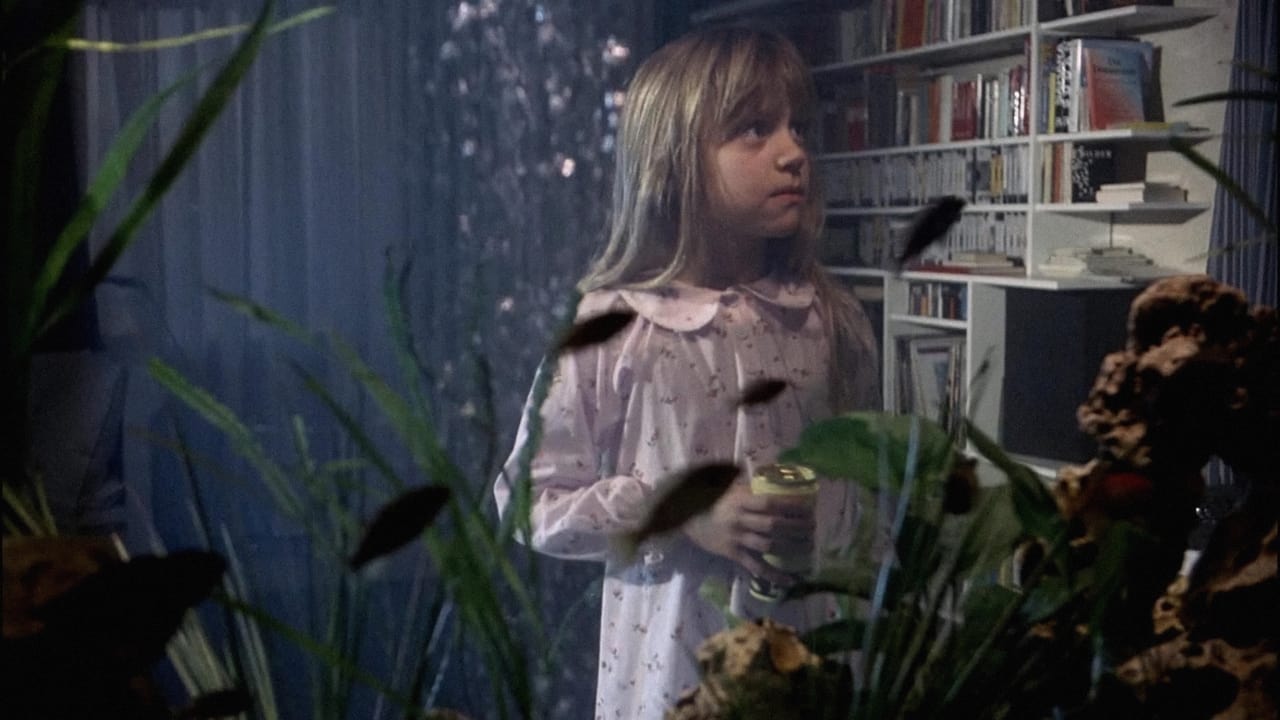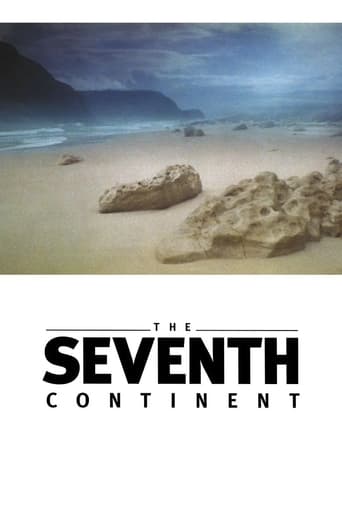

Wonderful character development!
... View MoreThe film makes a home in your brain and the only cure is to see it again.
... View MoreThe acting is good, and the firecracker script has some excellent ideas.
... View MoreThe movie is made so realistic it has a lot of that WoW feeling at the right moments and never tooo over the top. the suspense is done so well and the emotion is felt. Very well put together with the music and all.
... View MoreHaneke begins his debut film with a shot of a family going through a car wash that lasts more than 8 minutes. Not exactly the most riveting of beginnings. The next sequence is something everyone can relate to; waking up to the buzzing alarm clock, getting ready for the day's events, and having breakfast. This has a inkling of familiarity to it, because for almost the entirety of this scene Haneke avoids showing our family's faces. He shoots closeups of milk being poured, of coffee being prepared, of shoes being tied, of pet fish being fed. It is only until later that we get a clear view of these people. Instead, what characterises them is this droning voice-over of a letter being narrated from the mother Anna to her in- laws. Life is well. Georg is on the brink of a promotion. Alexander has recovered from his mental breakdown. See, it's nothing but good news. At the start of part 2, Haneke repeats the same sequences. The waking up, the breakfast, the getting ready for work. Again, the droning voice-over bears good news. George is head of his division. Alexander is much better. The new boss is coming for dinner. Posters, and dreams, reveal the same recurring landscape of an Australian beach, its waves pushing up against the shore. This has an eerie calmness about it, because in the background is a giant mountain range that renders the waves physically impossible, like a fantasy gone wild. But they yearn for it anyway. In the repetition, the daily struggle becomes a slow, torturous existence, marked by these empty soulless routines that begin to consume them. By the time part 3 rolls around, the voice-over slips into its final, chilling denouement. Haneke's stylistic tendencies are most obvious in his debut, and less restrained. He uses no non-diegetic sounds so that the family has to endure the uncomfortable silence and the buzz of all things living while they barely live themselves. This allows the blackout cuts to flow from one period to another, and symbolise passing of time while nothing else changes at all. The washed out, pale palette captures these sterile environments at their peak banality, and the long takes, still and unmoving, linger for longer than necessary until the presence of the camera becomes uncomfortable. He then shatters these portraits with moments of such startling and unnerving emotion; Alexander breaking into sobs at the dinner table, Anna slapping Eva after promising not to do so, her later breaking down in the car, and so on. This mood is repeated in the final segment to such stunning effect. They systematically destroy their lives in the same vapid, tired manner as they have been behaving throughout the film. They get their affairs in order, delegate the shop to Alexander, close their bank accounts and withdraw all their cash. Then the entire house is trashed. Furniture is ripped beyond repair. Clothes are cut into ribbons. Cupboards are empty. This is all done silently, devoid of any emotion or rage or distress. Then again, he shatters the air of nonchalance in the only way he can, through the young Eva, who after the days in and days out of feeding the fish, cannot take smashing the fish tank. Later Anna reacts the same way as she sobs over her corpse, while an almost comatose George watches on and follows put with the suicidal dose. It takes a great deal of skill and sensibility to make a film with this sort of subject matter, and it is even more impressive in a debut. What is crucial to its execution is its ability not to understand why a family would do such a thing...but to merely linger in the presence of their despair. Nothing is learned or gained, but we attempt to rationalise and decipher it anyway. Haneke would later master this concept in Hidden, but here is is just as horrifying. Against so many screen portrayals of suicide that are romanticised and exaggerated, this rings truer, more painful.
... View MoreIt's 1989. As the Cold War was taking its last desperate gasps of air, filled with the debris of that crumbling wall, a demure, isolated and all-too-familiar middle-class family sits at their breakfast table in Austria as they continue to perform their meandering daily activities. Is this a better life? Is this what the Western, free-market promised? Just a bunch of junk they don't need, depressing karaoke television and convenience food? Did this family miss the comfort of Communism? We don't know, but without getting all Fight Club about it, Michael Haneke's debut, The Seventh Continent displays the bourgeois misery that serves as the pilot light of the ensuing self-destruction of Western civilization. With his cold-clinical style using diegetic sound and long takes that challenge our patience, Haneke brings us something more sobering and nihilistic than anything that David Fincher and Chuck Palahniuk could brainstorm. What makes this film so effective is the vicarious nature of the narrative. These people did what I did in the last week and will probably do again tomorrow. We dine with them, we shower with them. We see ourselves in them. While they are economically stable, they seem to have lost their souls. In typical Haneke fashion, he dissects the ordinary family and isolates their experiences to capture their emptiness. He brings out the themes that we would see in Funny Games and Time of The Wolf. The emasculated, apathetic father, the mother whose emotions are on the edge, as we see when she is going through the car wash that reminds her of the accident they saw in the rain. It's a Kafka tale with no transformation. Nearly a decade later, the US took a crack at this theme with the Oscar-sweeping American Beauty. With that film, Lester Burnham gave the viewer a glimpse into the emotional failure of the American Dream. Yet Lester took charge and gave himself what he wanted. As he defied the control of his wife and shed responsibility, it became the ultimate Men's Rights battle-cry. And as with other American suburban satires, like Happiness, there is still a degree of mythology. Life can be that bad for some people, but not for every member of one family. It comes off as a sort of misery-porn. But Haneke does not allow the audience to have what it wants. He wants to probe us and make us question our priorities and collective reality. There is no dream. No fantasy, because what their wasted potential as humans is too depressing to think about. No escape. Or maybe there is, but what is the cost of that escape? Without giving too much away, there is a climactic sequence in which the family puts their priorities to the test by destroying their property. What about the record collection? Is that the husband's or the wife's? Is there a feminist subtext behind a woman destroying a man's record collection? And finally, as far as destruction goes, I will say, that the fish tank scene in this film far exceeds the potency of the Martin Riggs "MINEY MO!" from Lethal Weapon 2. .....Also from 1989.....(scratching chin)
... View MoreI sadly to say go with the latter. I only recently became interested in Haneke's work after viewing Funny Games, being completely hypnotized and blown away by the magnificent work. "Cache" was enjoyable to me but I was hoping for more, I've seen plenty of European cinema, hundreds, but the ending was just too disappointing.I made it an effort to see every Haneke film on DVD possible, starting in chronological order I watched this film and was just utterly taken aback by it instantly. I think to really comment on cinema one needs to be objective and know history of films similar to this type of intense plodding character (in this case family) study. To put it simply if it wasn't for being able to fast forward with subtitles still on I would have stopped this film within 30 minutes. The die-hard film lover in me pressed on expecting something important from this.Let it be said, I never heard the hype surrounding this film nor did I view this IMDb page until AFTER I saw it. Complete 100% unbiased opinion and I thought it was trash. I fully understand someone can argue the idea it was so plodding and boring is because it's a film detailing how monotonous a life in the 21st century can get. To me, he easily could have shortened the film down, hell this could have been a short film reeling no more than 30 minutes and get the point across. After scene after scene it becomes obvious to the viewer the style he is going for, eventually turning predictable. You get where he's going with the film and just want the pay off already. It comes and in my case I was left wondering what a waste of time.Film in the past has done a better and more remarkable job getting across the point of alienation humans can feel in modern society. Better pacing, establishing reason and emotions for characters, not over-indulging in film techniques. Instead this film displayed trite and mind-numbingly boring imagery. One of the worst art house films I've ever seen. A shame real fish had to die or suffer for this film. Haneke is clearly an auteur and I can only hope his films get better with each successor.
... View MoreI went into this film with very high expectations. Unfortunately, I can't say that it lived up to them. The first hour is incredibly dull, as we watch an upper middle-class family lifelessly perform mundane tasks (take a shower, eat breakfast, tie shoes, etc.). I failed to sympathize with any of the characters, and some scenes dragged on so long that I found my mind wandering. I generally don't mind long takes, and even in other films by the same director (Funny Games, Benny's Video, etc.) thought they were used extremely well. However, here they were simply tedious.The film wasn't totally a let down however; far from it. The last 45 minutes really picks up intensity and re-grabs the viewer's interest. I won't spoil anything for those who haven't seen it, but the scene in which the family destroys their own house and possessions is extremely well done. The ending is bleak and depressingly powerful, and I realized that it wouldn't have worked without the boring first hour. But that doesn't change the fact that it was boring.Overall, I had trouble giving this film a number rating, but I guess it would be somewhere around a 6/10. I think it's possible that that number would change on a second viewing, but to be honest, I doubt I would ever want to watch this film again.
... View More